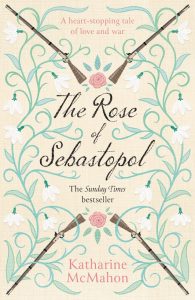A lifetime’s training in sheer bloody-mindedness
30 April 2020 | Katharine McMahon
Florence Nightingale’s life sometimes reads like fiction. From a position of deep ignorance and frustrated young-womanhood she was propelled into the limelight and became a beacon of hope during the Crimean War, and a worldwide figurehead for nursing and military medicine.
It was this, the sheer drama of Nightingale’s life, that was my initial inspiration for The Rose of Sebastopol. My heroine, Rosa Barr, is brought up close to the Nightingales’ Derbyshire home of Lea Hurst. She knows that young Florence has become a legend among the sick and poor in the local villages, and that she has ambitions to be a nurse, despite the steadfast opposition of her family. From a young age, Rosa wants to be like Nightingale.
But I soon realised that it was a mistake to suppose that Nightingale had no training at all. In fact she had spent half a life-time preparing for the moment, in 1854, when she set sail for the battlegrounds. But until calamity struck the British army in Russia, she had no idea what she was preparing for.
And that, I guess, is what we’re all discovering at the moment; resourcefulness, skill, expertise, compassion – none of these qualities comes by accident. Readiness is all.
So here’s how Nightingale trained:
- Sheer bloody-mindedness. As a Victorian girl born into a wealthy family she was expected to fritter away her life in the drawing rooms of great houses. Instead she drove herself nearly mad in her quest for a vocation. And bloody-mindedness is exactly what was required when faced with the intransigence of an army medical system that had not been reformed since Waterloo.
- She learned how small interventions can make a major difference to the patient – and to the nurse. As a young girl, the only time she was truly happy was when she acted as a kind of early district nurse among the poor and sick in local villages. In her own house, she was stifled by the demands of a neurotic mother and sister. Amongst her father’s tenants, she discovered people to whose lives she could truly make a difference.
- She was well-travelled and used to negotiating foreign climates and cities. Subversively, she used cultural trips abroad to visit religious institutions engaged in nursing. Kaiserworth, in Germany, was a hospital run by deaconesses. No female was allowed on a men’s ward after 8 p.m., and although Nightingale described the place as dirty, at least she had first-hand experience of a relatively well-run medical institution.
- She was experienced in administration. About a couple of years before the war, Nightingale persuaded her parents to let her become superintendent of a residential establishment for retired gentlewomen. Thus she had the opportunity to plan an entire institution from diets to floor coverings, hot water to dumb waiter.
- She was a hardened campaigner – almost from birth. She wanted a different life to the one in which she’d been born. Tenacity was her watchword.
So although there was nothing structured about her training, Nightingale was as ready for the call as any woman in England. But it’s small wonder that after the war she devoted much of her energy to setting up a training school for nurses. She knew exactly how woefully under-prepared she, and indeed the entire nation, had been for the calamity that befell British troops in the Crimea.
Famously she wrote: I stand at the Altar of the murdered men and while I live I fight their cause.
Today’s Queen’s Nurses reflect the same characteristics that Florence Nightingale showed and these values lie at the heart of the Queen’s Nursing Institute, which she helped to establish in 1887.
To mark Florence Nightingale’s 200th anniversary, a special new edition of The Rose of Sebastopol by Katharine McMahon is published by W&N as an £8.99 paperback & e-book on 30 April.
To enter our prize draw for a free copy of the book, email mail@qni.org.uk with your name and postal address. As a tie breaker, please name the three cities in England that have a public memorial of Florence Nightingale.
Main photo: Barbara Luckhurst www.barbaraluckhurstphotography.com


 Back to Blog
Back to Blog